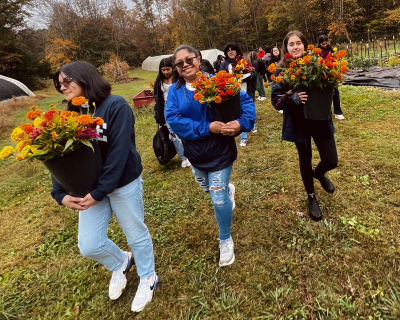
Cara August, Trinity Communications
On a drizzly Tuesday morning in late October, a group of students from Sophia Enriquez’s Introduction to Latino/a Studies in the Global South class piled into a bus and headed to a farm in Hillsborough to pick cempasúchil flowers, a species of marigold known as flor de muerto or flower of the dead.

It’s not what the students had expected to do that morning, but a frost was setting in and the symbolic flower — believed to guide souls back to the land of the living with its vibrant orange hue and fragrant scent — was needed for the Dia de los Muertos celebration taking place later that week at the Avila Center in Durham.
“We have to respond to the needs of the community,” Enriquez said. "This is part of the work and what we’re teaching students.”
Working at the intersection of Latino and Appalachian music, migration and regional culture, Enriquez, who is the Andrew W. Mellon Assistant Professor in Music and an Assistant Professor of Gender, Sexuality and Feminist Studies, identifies as a scholar-artist, and believes that community engagement is essential as a performer and in her approach teaching.
“Before I’m a professor at Duke, I’m a part of this community,” she said. “I think it’s really important to bring my full self — musician, scholar — to each class and each interaction.”
Enriquez is passing on that lesson to her students at Duke by planning off-campus visits and guest presentations from artists and activists, and by starting each class with a simple question: “Who has an upcoming event to share?”
Sophomore Mariana Meza — an active member in several Latinx organizations at Duke, including Mi Gente, Duke’s largest Latinx student organization — appreciated having a platform to share events happening on and off campus.
“It was great to be in a classroom space where we were encouraged to share community events,” Meza said. “Some students hadn’t been involved in Mi Gente until the class offered an opportunity to share how to get involved.”

Meza, who grew up along the US-Mexico border and whose family is originally from Mexico, has taken several Latino Studies courses at Duke, but Enriquez’s Intro class was the first one that included community engagement and a service-learning component.
“Until I took Professor Enriquez’s Intro class, I wasn't aware of how many opportunities there are to be involved in the Durham Latinx community,” she said. “There was a great balance in this class of connecting content to our personal experiences, especially when community members would come to class as guest speakers.”
One guest speaker, local organizer Yolanda Zavala, who founded Durham’s annual Día de los Muertos celebration, shared her experience of starting the event when her immigration status prevented her from returning to Mexico to attend her sister’s funeral.
Now in its seventh year, the event hosts performances from more than 10 Azteca dance groups from all over the South, and community members gather to build ofrendas to honor loved ones who have passed away. This year, in additional to volunteering for the event by picking flowers and cleaning a children’s cemetery, Enriquez’s students also attended the celebration together to build a group altar as part of class project.
Student Leonel Rangel-Jimenez, a Biomedical Engineering major who grew up in Durham and whose parents immigrated from Michoacán, Mexico, brought his mother and five siblings to the event. His mother, who suffered a stroke in 2016, was moved by the celebration and its deep sense of community.

“For a long time, while my mom was recovering, my siblings and I lacked those interactions with her,” he said. “This community event was really touching to her, something she really enjoyed — I did, too,” he said.
In addition to creating a class altar, decorated with photographs, papel picado, cempasúchil flowers and specialty food items, the students also set up a hot chocolate station to offer a warm, sweet drink to others, especially the dancers. “It was going to be a cold night,” Jimenez explained. “We were guests, so we decided to bring something to share with everyone.”
“Everything about this work is community, in spirit,” Enriquez noted. “If someone brings food or a drink, it is to share.”

The same was true on the last day of class, when Enriquez and her students gathered in a History department classroom to enjoy a meal together — plates of crispy empanadas filled with plump beans and seasoned shredded chicken from a local Puerto Rican restaurant, and cups of chicha morada — while reflecting on key take-aways from the term.
At the front of the classroom, Enriquez recorded the students’ reflections on the large whiteboard: Latinx histories, identity and belonging, preserving stories, storytelling through art, political life and activism, community building.
A critical part of the class for Jimenez was the opportunity to connect through storytelling and learning about different styles of music. Jimenez, who like many students in the class refers to Enriquez simply as profe, an endearing abbreviation of the Spanish profesor, would leave Enriquez’s class with his mind buzzing about Latinx communities, history, politics, culture, language and, especially, music.
“I would leave profe’s classes with a lot of thoughts about everything that we learned about and the different types of music that I'd never been able to put names to,” he said.